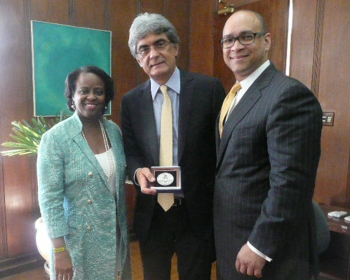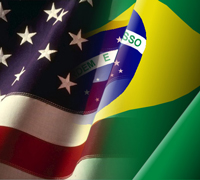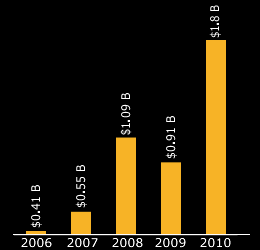US-Colombia FTA will increase opportunities for American exporters and create American jobs
 This summer, the United States Department of Commerce, in conjunction with the State Department, held a webinar that outlined the US-Colombia Free Trade Agreement (FTA) and explained what this historical agreement would mean to businesses in the United States.
This summer, the United States Department of Commerce, in conjunction with the State Department, held a webinar that outlined the US-Colombia Free Trade Agreement (FTA) and explained what this historical agreement would mean to businesses in the United States.
Over 200 businesses registered for this webinar and had the opportunity to have their questions answered directly by the Ambassador to Colombia Michael McKinley, National Deputy Director of the Minority Business Development Agency, Alejandra Y. Castillo, and Michael Masserman, Executive Director for Export Policy, Promotion and Strategy at the International Trade Association. To help advance President Obama’s National Export Initiative, the presenters educated export-ready business owners about the potential of the U.S.–Colombia Free Trade Agreement. This Free Trade Agreement has massive potential for American business, as this new agreement could increase U.S. exports by $1.1 billion.
Why should American businesses (especially small ones!) care about exporting? Because through exports a company of any size can increase their sales, enter previously untapped markets, and strengthen the financial stability of their company. Most importantly, exporting is one of the key methods for putting Americans back to work. This is especially true for minority-owned businesses that are exploring other ways to employ American workers. Minority-owned businesses have a competitive advantage in global trade based on their cultural ties, language skills and nimbleness.
The 2007 Survey of Business Owners reveals that among firms with export sales representing 20 percent or more of their overall receipts, minority-owned businesses are twice as likely to export compared to non-minority firms. In addition, minority firms are more than three times as likely to have businesses generating 100 percent of all their sales in exports compared to non-minority respondent firms. This finding is quite substantial because it supports the Administration’s goal to double the nation’s exports by the end of 2014.









 The Department of Commerce's
The Department of Commerce's 
 MBDA National Director Hinson and Shawn Ricks, Senior Advisor to the National Director on Global Affairs began a five-day trip to Brasilia and Sao Paulo, Brazil. This trip will provide an opportunity for MBDA to build relationships with key stakeholder groups essential to reaching its export targets under the National Export Initiative, create greater access to emerging markets for minority business enterprises, and support job creation in the United States.
MBDA National Director Hinson and Shawn Ricks, Senior Advisor to the National Director on Global Affairs began a five-day trip to Brasilia and Sao Paulo, Brazil. This trip will provide an opportunity for MBDA to build relationships with key stakeholder groups essential to reaching its export targets under the National Export Initiative, create greater access to emerging markets for minority business enterprises, and support job creation in the United States. This summer, the United States Department of Commerce, in conjunction with the State Department, held a webinar that outlined the US-Colombia Free Trade Agreement (FTA) and explained what this historical agreement would mean to businesses in the United States.
This summer, the United States Department of Commerce, in conjunction with the State Department, held a webinar that outlined the US-Colombia Free Trade Agreement (FTA) and explained what this historical agreement would mean to businesses in the United States. Indonesia is Southeast Asia’s largest economy and while Indonesia’s annual growth slowed down to 4.5% in 2009, it expanded to 6.1% in 2010. Some economists predict that Indonesia’s economic growth may reach 8% in 2011. During the difficult global conditions of 2009, Indonesia’s economy was among the top worldwide performers. Stock market valuation was up 87% in 2009 and 46% in 2010 and from 2000 until 2010, Indonesia’s average annual GDP growth was 5.17% with a stable currency and improved sovereign credit status.
Indonesia is Southeast Asia’s largest economy and while Indonesia’s annual growth slowed down to 4.5% in 2009, it expanded to 6.1% in 2010. Some economists predict that Indonesia’s economic growth may reach 8% in 2011. During the difficult global conditions of 2009, Indonesia’s economy was among the top worldwide performers. Stock market valuation was up 87% in 2009 and 46% in 2010 and from 2000 until 2010, Indonesia’s average annual GDP growth was 5.17% with a stable currency and improved sovereign credit status.

